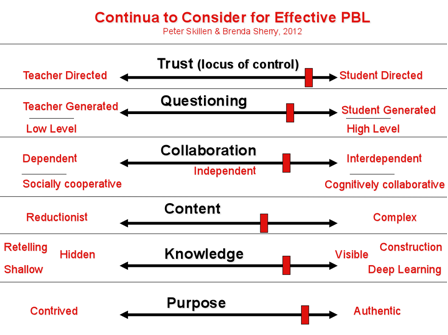Project Based Learning (PBL) is not a question of "on or off", do PBL or not do PBL... It can mean different things to different people. There are a lot of variations (like in any other educational methodology) and any teacher can construct their own version just by adding or changing some parametres.
Peter Skillen suggest to consider some parametres and to study many of the great resources that are available to you and then create your own working definition and effective PBL practice. (You can find some of these resources below.)
The following diagram, enhanced by the critical eye of Brenda Sherry, can help you figure out what’s important to you and your students, just by sliding from one side to the other the level of each parametre to be considered in your PBL practice.
You could likely add other dimensions to consider (for instance, time management) as you build your own understandings and beliefs!
Trust
Who is in control? Who is initiating the project? Whose passion is being honoured with the project? Who is setting the goals, timelines, and motivation? Are you scaffolding the students’ success through templates, calendars, checklists, rubrics or are you unwittingly stealing their locus of control and micromanaging them. Been there. Done that! Thought I was helping them by giving them lots of assistance!
Questioning
Who is asking the question to be investigated in the project? The student or the teacher? Is the question a ‘deep, driving question’? Is it a ‘fat’ question or a ‘skinny’ one?
Collaboration
If the projects are collaborative in nature, you may wish to consider the amount of interdependence that students have with one another. Are they merely gluing their parts together to make a whole or do their conversations and co-creations lead to a whole that is greater than the sum of its parts?
Content
Is the content a rich, deep problem space or is it a more narrowly focused content area? Are there natural links to other domains that provide a context or is the content deconstructed to remove seemingly distracting and disparate information?
Knowledge
Are the students involved in constructing new meanings and understandings or are they simply retelling in their own words information they have found during their research? Have you built in mechanisms (blogs, wiki, vokis, public journal writing, etc.) so that student thinking is made visible, transparent and discussable or is most student process hidden and unavailable to others?
Purpose
How authentic is the problem under investigation? Are students ‘being’ scientists, historians or geographers and so on, or are they ‘studying’ science, history and geography? How much is the project based in the real world of the student? Is it purposeful for them?
Great Resources for Project Based Learning
- Brenda’s excellent Tech2Learn wiki has a Project-Based Learning page which we developed for some workshops. It includes resources from the best of the best:
- Jane Krauss and Suzie Boss – Reinventing Project-based Learning
- Edutopia
- Buck Institute for Education
- Linda Darling-Hammond – Powerful Learning
- Learning Zone and The Construction Zone blogs.
Chart: Effective PBL Continua by Peter Skillen & Brenda Sherry is licensed under a Creative Commons Attribution-NonCommercial-ShareAlike 3.0 Unported License.
This post originally appeared on Jul 13, 2012 in Voices from the Learning Revolution, by Peter Skillen


No comments:
Post a Comment